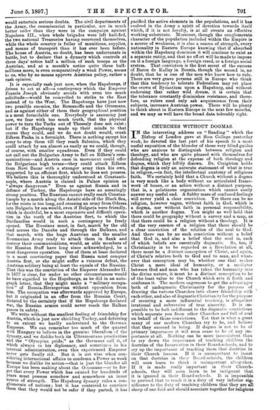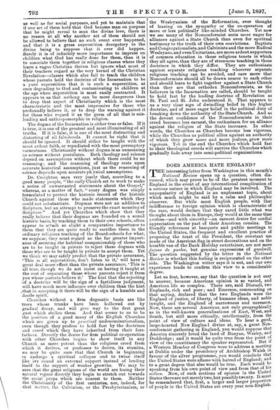0.11U.11,CHES WITHOUT DOGMAS.
the interesting address on " Reading " which the Bishop of London gave at Sion College yesterday week, he devoted the last part of his speech to a most useful exposition of the blunder of those very blind guides who are anxious to distinguish between religion and theology, and who are quite pleased with themselves for defending religion at the expense of both theology and dogma, which they loftily disown. Dr. Creighton holds that dogma is only an accurate statement of what is true in religion,—in fact, the intellectual anatomy of religious faith. We certainly hold that a Church without a dogma is very much like a body without an articulated frame- work of bones, or an action without a, distinct purpose, that is, a gelatinous organisation which cannot easily answer any useful end. A flabby mass of confused feelings will never yield a clear conviction. Yet there can be no religion, however vague, without faith in God, which is a dogma, nor without faith in personal responsibility, which is another dogma. You might as well hold that there could be geography without a survey and a map, as that there could be a religion without a theology. It is, of the very essence of a religion that there should be a, clear conviction of the relation of the soul to God. And there can be no such conviction without a belief that God is, and also a belief that the soul is, each of which beliefs are essentially dogmatic. So, too, if Christianity is to be regarded as a Revelation at all, there must be a distinct conception of Christ, and again, of Christ's relation both to God and to man, and what- ever that conception may be, whether one that makes Christ a mere ideal of humanity, or a mediator between God and man who has taken the humanity into the divine nature, it must be a distinct conception to be of the least value to the Church which sets it forth and confesses it. The modern eagerness to get the advantages both of =dogmatic Christianity for the purpose of drawing the various Churches into closer friendship with each other, and also of dogmatic Christianity for the purpose of securing a more influential teaching, is altogether irrational and subversive of true sincerity. It is im- possible to be both indifferent to the dogmatic convictions which separate you from other Churches and full of zeal on behalf of those convictions. Yet that is what a great many of our modern Churches try to be, and believe that they succeed in being. If dogma is not to be of primary importance it will soon cease to be of any im- portance at all. Nothing can be more inconsistent than to cry down the importance of teaching children the doctrine of the Incarnation in their Board-schools, and to cry up the importance of teaching them that doctrine in their Church lessons. If it is unimportant to insist on that doctrine in their Board-schools, the children will soon learn to think it unimportant altogether. If it is made really important in their Church- schools, they will soon learn to be indignant that it is ignored in their Board-schools. It is impossible to pretend that to teach it is a duty of very inferior sig. nificance to the duty of teaching children that they are an sheep of one fold and should associate together for religious as well as for social purposee, and yet to maintain that if one set of them hold that God became man on purpose that he might reveal to man the divine love, there is no reason at all why another set of them should not be allowed to believe that no such event ever happened, and that it is a gross superstition derogatory to the divine being to suppose that it ever did happen. Surely it is of infinitely more importance to impress on children what God has really done for them, than it is to associate them together in religious classes where they learn a vague Christian theism but ignore what most of their teachers regard as the very kernel of the Christian Revelation—classes which also fail to teach the children whose parents hold the doctrine of the Incarnation to be a pure superstition that it is such a superstition, at once degrading to God and contaminating to children at the age when superstition is most easily contracted. It appears to us that nothing can be more dangerous than to drop that aspect of Christianity which is the most characteristic and the most impressive for those who profoundly believe it, or to drop the warning against it for those who regard it as the germ of all that is mis- leading and anthropomorphic in religion.
The dogma of the Incarnation is either true or false. If it is true, it is one of the greatest and most illuminating of all truths. If it is false, it is one of the most distracting and distorting of all falsehoods. It cannot be right that it should be ignored. It should either be taught with the most ardent faith, or repudiated with the most peremptory earnestness. Christianity without dogma is as unmeaning as science without postulates. Both theology and science depend on assumptions without which there could be no reasoning ; and the reasoning of theology rests upon accurate historical assumptions, just as the reasoning of science depends upon accurate ph ysical assumptions.
Dr. Creighton says very justly that, according to a good many people, " the early Church set to work to make a series of unwarranted statements about the Gospel," whereas, as a matter of fact, " every dogma was simply formulated to protect the historic record of the historic Church against those who made statements which they could not substantiate. Dogmas were not an addition to Scripture, but an attempt to preserve the exact meaning of Scripture." And yet Churches which show that they really believe that their dogmas are founded on a sound historic basis, by teaching them to their own schools, often appear to attach so slight a comparative importance to them that they are quite ready to sacrifice them in the ordinary religious teaching of the Board-schools for what, we suppose, they must regard as the far greater import- ance of securing the habitual companionship of those who are to be taught in private to reject these dogmas with those who are to be taught in private to accept them. Yet we think we may safely predict that the private assurance, 'This is all superstition, don't listen to it,' will have a great deal more effect than the private assurance, This is all true, though we do not insist on having it taught at the cost of separating those whose parents reject it from you whose parents believe it.' The hint that the rejecting of a doctrine will be the sign of a fastidious judgment, will have much more influence over children than the hint that in accepting it there will be the sign of a humble and docile spirit.
Churches without a firm dogmatic basis are like trees whose trunks have been hollowed out by gradual decay, and will give way to the first great gust which strikes them. And that seems to us to be the position of a good many of the English Churches which are given up to practical undenominationalism, even though they profess to hold fast by the doctrines and creed which they have inherited from their fore- fathers. Directly the desire for firm political co-operation with other Churches begins to show itself in any Church as more potent than the religious creed from which it derives, or professes to derive, its stamina, we may be quite sure that that Church is beginning to undergo a spiritual collapse and to twine itself like ivy round an external support instead of lending itself to the support of weaker growths. We may be sure that the great religions of the world are losing their natural vigour directly they begin to stretch out towards the social props which are nearest to them. Neither the Christianity of the first centuries, nor, indeed, for that matter, the Calvinism, or the Presbyterianism, or the Wesleyanism of the Reformation, ever thought of leaning on the sympathy or the co-operation of more or less politically like-minded Churches. Yet now we see many of the Nonconformist sects more eager for alliances against a State Church than even for spiritual testimony to the truth of their own convictions. Baptists and Congregationalists, and Calvinists and the more Radical Wesleyans, and evenUnitarians, are more ardent supporters of common education in those religious tenets in which they all agree, than they are of strenuous teaching in those doctrines in which they differ. They are enthusiasts against separate religious teaching wherever separate religious teaching can be avoided, and care more that Nonconformists should all be drawn nearer to each other and should learn to fight together against a State Church than they are that orthodox Nonconformists, as the believers in the Incarnation are called, should be taught to hold fast by the leading doctrine of Revelation as St. Paul and St. John understood it. That appears to us a very clear sign of dwindling belief in this higher doctrine, and of more eager belief in the political duty of breaking down the authority of the State Church. And as the devout confidence of the Nonconformists in their creed becomes less earnest, the enthusiasm for an alliance against the religion of the State increases. In other words, the Churches as Churches become less vigorous, while the Churches as political allies against an authority of which they grow more and more jealous, grow more vigorous. Yet in the end the Churches which hold fast to their theological creeds will survive the Churches which gradually fade away into semi-political organisations.







































 Previous page
Previous page